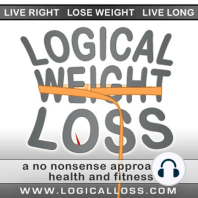24 min listen
What's The Deal With Intermittent Fasting
ratings:
Length:
33 minutes
Released:
Sep 3, 2018
Format:
Podcast episode
Description
What is Intermittent Fasting? ( If) Intermittent Fasting sounds too good to be true. It's not about WHAT you eat, but WHEN you eat it. Sound great right? Not so fast this doesn't mean the floodgates are open to eating whatever you want (pizza, ice cream, soda, etc) When you are in the fed state, it's very hard for your body to burn fat because your insulin levels are high. It is much easier for you body to burn fat in the fasted state (8 - 12 hours) because your insulin levels are low. Fasting puts your body in a fat burning state that you rarely make it to during a normal eating schedule. Our bodies run on glucose, or simple sugar, but when we fast for a longer period of time, that energy source becomes unavailable. The body begins to convert certain types of body fat into fatty acids, which are easily absorbed by the blood. Most of the studies reviewed by Anton and team revealed that, while participants did lose body fat, no significant amount of lean tissue — which includes organ tissue, muscular tissue, and bone tissue — was lost. (source) Many Different Intermittent Fasting Styles or Programs These are the some of the popular methods: The 16/8 method: Also called the Leangains protocol, it involves skipping breakfast and restricting your daily eating period to 8 hours. So if you breakfast and eat lunch at Noon, you can eat from noon to 8 PM. Then you fast for 16 hours in between. This means you could eat again at Noon the next day (16 hours from 8 pm) Eat-Stop-Eat: This involves fasting for 24 hours, You would do this once or twice a week, for example by not eating from dinner one day until dinner the next day. The 5:2 diet: With this methods, you consume only 500–600 calories on two non-consecutive days of the week but eat normally the other 5 days. Obviously, with the reduced calories, this should lead to weight loss assuming you don't binge eat on the five days and eat healthily. Many people find the 16/8 method to be the simplest, most sustainable and easiest to stick to. It’s also the most popular. Why in The World Would I Starve Myself? When you fast, human growth hormone levels go up and insulin levels go down. Your body’s cells also change the expression of genes and initiate important cellular repair processes. Short-term fasting may increase your metabolic rate by 3.6–14%. Source Intermittent fasting can have many benefits for your body and brain. It can cause weight loss and may reduce your risk of type 2 diabetes, heart disease and cancer. It may also help you live longer. Side Effects I was shocked to hear that the main side effect of Intermittent Fasting is, (get this ) HUNGER. Who knew? Here are some other things to keep in mind You may also feel weak and your brain may not perform as well as you're used to. This may only be temporary, as it can take some time for your body to adapt to the new meal schedule. If you have a medical condition, you should consult with your doctor before trying intermittent fasting. This is particularly important if you: Have diabetes. Have problems with blood sugar regulation. Have low blood pressure. Take medications. Are underweight. Have a history of eating disorders. Are a woman who is trying to conceive. Are a woman with a history of amenorrhea. Are pregnant or breastfeeding. All that being said, intermittent fasting has an outstanding safety profile. There is nothing dangerous about not eating for a while if you’re healthy and well-nourished overall. As with all changes in diet or exercise - consult with your doctor to see if this is right for you. Can I Eat ANYTHING? During The Fast? From what I've read, no. You can have water, coffee, tea and other non-caloric beverages are fine. Do not add sugar to your coffee. Small amounts of milk or cream may be okay. I Thought Breakfast Was the Most Important Meal of the Day? Some people are now saying that people who eat a breakfast, actually eat a healthier meal (not fruit loops, and coco puffs). So skipping the bowl of sugar
Released:
Sep 3, 2018
Format:
Podcast episode
Titles in the series (100)
Getting Your Weight Loss Back on Track: Straplees Heart Rate Monitor From the forums we hear, "This is just a watch. No chest strap. YEAH! It gives you your heart rate when you hold with your thumb and index finger. It takes just a few seconds and when it displays it automatically shows yo. by Logical Weight Loss
